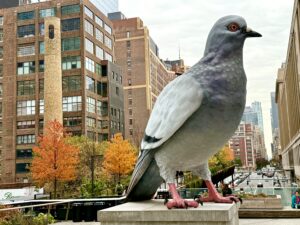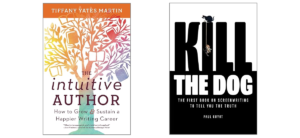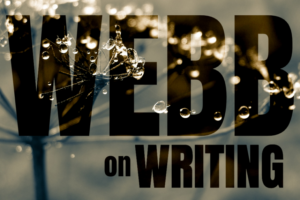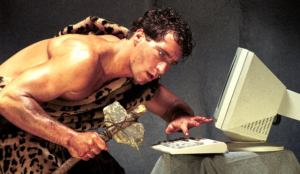Health
As a connoisseur of writing how-tos (and yes, I had to look up how to spell connoisseur – and okay, “addict” might be a more accurate word), I have read a TON of them. And while I find valuable nuggets in nearly all of these books, lately I’ve noticed that many recent writing how-tos are essentially sharing slightly different flavors of some very similar core information.
So when I encounter a book about writing that offers some new (to me, at least) ways of looking at the craft, I sit up and take notice. My gushing ode to Chuck Palahniuk’s Consider This in this 2020 post is an example.
I just finished reading another such departure from mainstream writing how-tos: The Intuitive Author, by WU’s own Tiffany Yates Martin, who, in addition to being a wonderful writer and editor, is also an insanely good teacher and public speaker. Seriously, if you ever have the opportunity to attend one of Tiffany’s sessions or events, take it. And if you’re an author who speaks at literary conferences, trust me: you do NOT want to follow Tiffany. She’s that good.
Having seen Tiffany’s amazing presentation on backstory at WU’s brilliant 2022 OnCon, I knew what an extraordinary editorial mind she has, and how good she is at getting under the hood to amp up and improve your writing at multiple levels. So with The Intuitive Author, I guess I was expecting a book full of deep analysis into the mechanics of writing, along with some sophisticated editorial techniques. Instead, much of the analysis she offers in the book leans more towards the psychology and strategy involved in pursuing – and ideally, enjoying – the life of a writer.
I quickly realized I was not reading The Average Writing How-To, and I dove into the book with my curiosity piqued. (And yes, I had to double-check whether it was “piqued” or “peaked.” Got it right the first time – yay! Hey, it’s the small victories. But I digress…)
In short, The Intuitive Author is filled with insights and perspectives quite unlike those offered in the vast majority of writing how-tos currently on the market. And reading Tiffany’s book made me think about another writing how-to I’d recently read that takes a pretty big departure from most conventional writing wisdom: the provocatively titled Kill the Dog: The First Book on Screenwriting to Tell You the Truth, by author and screenwriter Paul Guyot.
What does this Guyot dude have against dogs, anyway?
Nothing, actually. Instead, the animal Guyot truly hates – and is taking a not-at-all thinly veiled swipe at – is the cat. Specifically, the cat in the well-known “Save the Cat!” series created by the late Blake Snyder.
If you’re not familiar, Snyder’s initial Save the Cat! book (STC to the cool kids) burst onto the scene in 2005 with a VERY structured set of templates for storytelling, which he reverse-engineered from studying many successful movie scripts. Targeted at aspiring screenwriters, Snyder’s methodology offered a compelling framework for them to adopt […]
Read MoreHave I said all I need to about craft and the writing life? This is what I asked myself as I searched my mind and heart for a compelling topic to write about. I have literally thought about this post for weeks and kept coming up blank until I realized that was the very thing – this coming up blank – that has plagued my writing life for the past six months. I’d sit at my desk and stare at my WIP, move a few commas around, reread what I’d written, maybe manage to eke out a few sentences, and then walk away. Over and over again, week after week, month after month. It’s been a frustrating year in that regard, and I started doubting the premise of my WIP. Would anyone want to read this book anyway? And then I started doubting myself. Maybe I couldn’t pull off what I was trying to do on the page. Maybe I’d forgotten how to write entirely.
So I’d been paralyzed, so much so, that I’d been stranded at the same 30k word count for months.
I’ve Got Nothin’
Read More“The moment my legs begin to move my thoughts begin to flow – as if I had given vent to the stream at the lower end and consequently new fountains flowed into it at the upper.” – Henry David Thoreau.[i]
Thanks to my parents’ foresight, little-girl me took swimming and tumbling lessons. I had a canary yellow bike with streamers dangling from the handlebars that carried me up and down the half-mile road leading from our house at the end of a cul-de-sac to the highway, whereupon I spun around and pedaled like the wind in the other direction (No helmet? What? Nah. This was 1977!).
But athletic I was not. I was an introverted, nose-in-a-book kid who made up mysterious ailments to get out of P.E., huddling miserably in the bleachers when it came time for a unit in basketball or soccer, knowing I’d be picked last for any team. Terrified of breaking my glasses, I would duck and cover my head if a ball—basket, base, volley—headed in my direction. Anything that demanded strength, coordination, and the ultimate horror—teamwork—would send me running for the hills. No pun intended.
Or rather, no pun at all. Reality was, if I wasn’t reading or writing in my room, I was outside and in motion. The pastures behind our house on the Olympic Peninsula of Western Washington state once fielded herds of dairy cows. An old barn, abandoned and caving in on itself, provided endless hours of make-believe, from Laura Ingalls-inspired frontier scenarios to Frances Hodgson Burnett-like secret gardens. The cow skulls and rib-cages hidden in overgrown fields of Timothy hay made for wild west and survival reenactments only fans of Grizzly Adams could appreciate. I rambled from open fields through forests of Doug fir and western red cedar until the sun dipped below the Olympic Mountains, coming inside only when the porch light clicked on, signaling it was time for dinner. I recall no feelings of loneliness—only a deep solitude that comes from having nothing more than my imagination for company.
Somehow that reserved, solitary kid who convinced herself she was hopeless at anything that involved Nikes and a gym bag became a reserved, solitary young woman who found her way first to a gym (because who wasn’t doing Step Aerobics in the nineties?) and then into a pair of running shoes, onto a bicycle (without streamers, sadly) and into a pool and finally swimming laps in Lake Washington. Into hiking boots that led her up mountains, into snowshoes that shushed through forests. Onto a yoga mat.
In fact, I became an athlete—regularly running half-marathons and competing in sprint triathlons—years before I became a writer. Prone to bouts of anxiety and depression, I turned to physical activity to keep my mind and my moods on an even keel. But it wasn’t until I began writing creatively in my early forties that I found full equilibrium. I needed both laps around a track and laps around a page to settle my mind and manage my world. It was then I discovered how physical exercise was critical to my creative expression.
Researchers have long agreed that there is a link between physical movement and enhanced cognitive and creative ability, even if they don’t fully understand […]
Read MoreFriends, last year was a doozy for me. The gap between all the hope-filled plans I was spinning, and the cold hard reality that I actually ended up living, felt like the Grand Canyon on steroids. Let me do my best to summarize the key events, because they provide context for why I decided to attend the San Francisco Writers Conference a couple weeks ago, and what I got out of it.
January 2023 – This is going to be my year! We are coming out of the pandemic! My kids are finally settled into full-time schooling! I am going to write again! More specifically: I am going to finish a new manuscript and send it to my agent!
February 2023 – NOPE. Instead: Mental health collapse! Three years of parenting small children through a global pandemic has taken its toll, and then a short-term family situation pushes me over the edge. I schedule my first ever therapy session. That very same week, my beloved agent informs me that she is leaving publishing. HAHAHAHA WHAT. Well, I guess it’s a good thing I’m already starting therapy…
March 2023 – Next up: Identity crisis. Am I a writer anymore? Do I want to be? Do I need to be? What does my life look like without writing? In fairness, I am already not writing very much… But I mean, what would it look like if I removed even the intention to write? Should I… Should I try it??
April 2023 – Trying it. Not loving it.
May 2023 – Okay, the upside is, I no longer end every day feeling bad about myself for not writing enough. (Or not writing at all.) That part is nice! The downside is, I very much still want to be writing.
In June 2023, two things happened that would help me greatly on my path back to the page. First, I started reading again. Not just dribs and drabs, but four-course meals of reading. Feasts of reading. Belly-so-full-it-hurts-and-yet-I-have-no-regrets of reading.
Second, I emailed Therese to ask if someone could cover my next Writer Unboxed post. I just didn’t have it in me to talk about writing. At that moment in my life, I wasn’t sure how — or even if — writing was going to figure into my future.
Therese responded graciously, of course. She told me not to worry about the post, and she also asked if it would be useful to me, in my wandering (mucking?) through all this, to attend the Writer Unboxed UnConference in November. If so, she would help me make it happen.
Unfortunately, due to various obligations, I couldn’t go to the UnConference — but my husband found space in his (insane) work schedule and gifted me a trip out to the San Francisco Writers Conference instead. I was hesitant at first. The cost! The time away from our kids, and the burden on my husband to solo-parent for so many days! Also, I wouldn’t know anybody like I would have at the UnConference!
But underneath all those concerns was this one true thing, a small voice gently ringing out from within me: I really wanted to go. I yearned to be […]
Read More
I think most of us would agree that 2022 was rough. The war in Ukraine. A war of another kind taking place right here at home, tearing apart families and communities, everyone pointing fingers at the “other side” for this pseudo-dystopian society in which we currently reside. For survivors of sexual or religious trauma—and there are MANY—simply keeping up with the news over the past year has been a daily minefield of panic triggers.
Writers, many of us empathic by nature, are hard-wired to struggle in this kind of reality. When marginalized and vulnerable groups are being targeted, we feel the echoes of history in our bones. We know that the educated and the artistic will be next. We’ve heard this story before. Hell, we may even have written our own versions of this story.
It never ends well.
Fellow authors are having their books banned in wide swaths of the country. We may be tempted to self-censor, to avoid controversy. Would we still want a character to choose abortion if a conveniently timed miscarriage would work? Would we risk having our book removed from school libraries by including a boy who wears black nail polish? Dare we say (or even imply) that he might be something other than straight? Do we set our story in 2019 or earlier to avoid making a political statement over the use (or not) of face masks? Do we avoid including minority characters or touching on any racial themes for fear of being labeled “woke”?
Having to even consider these things, to second-guess, is creative suffocation. It makes me want to slap a Pride flag on that boy’s drum set—yes, I’m talking about one of MY characters—even though he hasn’t yet revealed his sexuality to me. In the grand scheme of the story, it won’t even matter, but I can hear my two Gen Z girls chanting “Do it! Do it!”
So I might.
How do writers (or other artistic types) cope?
I’d be willing to bet many of us have spent the last year (or more) ping-ponging between rage and panic. Fight or flight.
It isn’t healthy. It isn’t sustainable without leading to despair.
For anyone else trying to claw themselves out of that trench, I propose making 2023 a self-care year. This will look different for everyone, of course, but collectively nurturing body, mind, and spirit may help us reclaim pieces of ourselves that have been lost, or at least temporarily silenced, in the upheaval around us.
Take care of your body
For me this means keeping on top of regular screening tests because I “won” the genetic lottery. It also means taking the damn vitamins, eating (or juicing) the damn vegetables, summoning the motivation to get back into a post-surgery exercise routine, and trying to sleep more. Have I succeeded in all of this? Not in the least. But I know what needs to be done and I’m working on it.
Take care of your mind
Take stock of those stressors over which you can have any control.
If beginning or ending your day by reading the news or scrolling through social media causes your cortisol levels to skyrocket, maybe now is the time to ditch that habit. Allow yourself ten to twenty minutes in the middle of the day to […]
Read MoreIf you’re in a non-writing phase and frustrated, several recent Writer Unboxed posts might speak to your lack of production. They address the seasonal nature of writing careers, the need to respect creative limitations, and how to cope when life gets in the way.
This is all well and good. I support this advice one hundred percent.
But what if, as per Kelsey Allagood’s recent post, some part of you knows fatigue and overwhelm aren’t your issue? What if somehow, despite a calendar that could be cleared and an express desire to write, your efforts can best be described as lackluster? What if encouragement doesn’t help but only deepens your shame and guilt?
Part of you knows you’ve been pulled into a self-destructive and self-sabotaging loop, yet you can’t figure out how to stop.
I’ve been here. It was a nasty experience I wouldn’t wish on anyone. Thankfully, I worked myself out of it and learned some Jedi mind tricks that have thus far prevented a recurrence. Knock wood.
But recently I stumbled across an evolutionary psychology podcast that might have spared me a good amount of suffering. It explained:
Today, I’d like to paraphrase Dr. Lisle’s theory, then describe how I see it applying to the writing world.
So This Hunter Walks Onto a Plain…
Let’s begin with a story set back in the Stone Age, when evolution shaped humanity’s current brain structure.
Imagine you are an able-bodied male and you’ve just reached the age of sexual maturity. You’re familiar with hunting implements and tactics, and you’ve participated in endless hunting parties with the other men of the village. Until now, between your size and talents, you have served in a supportive role.
Then one day, your spear flies true. You bring down the biggest, baddest beastie of them all.
Tradition demands that your contribution be honored. During tonight’s feast, you are served first, even before the village potentate. And your portion is enormous. Easily the biggest of your life.
Further, your social situation has improved. When you look around the fire, meat juices dribbling down your chin, men eye you with hitherto unfamiliar respect. And a whole cadre of previously inaccessible females are suddenly willing to flirt.
Why the change? Well, from an evolutionary perspective, today’s success signifies you might carry valuable genes their offspring can inherit, and that you’ll be a capable provider to your family and your community.
The Hijacked Brain
Evolutionary psychology says that your brain is an unsentimental cost-benefit calculator. In any given situation at any given time, it looks at available options and chooses the path which optimizes for survival and reproduction. (NOT for happiness, you’ll note, though sometimes happiness and evolutionary priorities can coexist.)
Q: So when the next hunting opportunity arises, how should you react?
A: That depends.
If you are confident in your hunting abilities, you’ll likely be eager to replicate your impressive performance. You’ll do this despite the risks of being trampled or gored because the extended mating and trading opportunities are too substantial to pass up.
If you’re less confident, you’ll be slower to pick up your spear—and […]
Read More
As my favorite Christmas episode of Doctor Who begins, “In the deepest part of winter, at the exact midpoint, everyone stops and turns and hugs and says well done, well-done everyone, we’re halfway out of the dark.”
We are regularly pulled in many directions, especially during the holidays when there are family obligations and parties on top of the regular everyday stress not bound to the month of December. What if during this midpoint in the year when the nights are long, what if, now bear with me, we take a break? As writers, we give so much of ourselves to the point where we are giving a part of our souls to the world through our words.
Recently while sitting down with a therapist, she stressed the importance of self-care and taking time out for myself. As someone who has always felt the urge to stay busy, constantly working and being involved with everything felt normal for me. There was no such thing as self-care. I grew up in a world where there were constant afterschool activities, we went to church three times a week and in between, we were spending time with family. So now at forty the idea of carving out a little time out of the day to do things like meditate, exercise, or even just be felt selfish. But what it comes down to is that self-care creates boundaries within ourselves.
I know, I know, the word boundary is that big scary B word that we all try to avoid. It makes others angry when we set them but in truth, the purpose of a boundary is to protect us, even if that person we need protecting is from within. One of the interesting things that began to happen for me was that when I took the time for myself there was a renewed vigor in not only my writing but in my personal life as well. Those moments of tranquility brought my imagination back along with the desire to want to write vs. feeling like I needed to write because it’s my job.
During this holiday season when the messaging is that it’s better to give than to receive, perhaps we can take a moment to give the gift of our presence. Whether it’s our work, our friends, our family, or ourselves the question we should ask when we wake up in the morning shouldn’t be what do we have to do today, it should be who do I want to be present for?
The funny thing about therapy is that it really does make you self-reflective, and once I finished the latest draft of my novel, I thought about what I wanted to do for the next few weeks. The answer, it turns out was just to be available for myself and my family. Are most of my family getting gift cards? For sure. Is my adult brother getting a stocking filled with a random assortment of sausages, toys, and whatever weird things I could find? Absolutely. But I am not feeling stressed out or overwhelmed by the holidays this year because I don’t feel like I have to do everything in a few short weeks. The next book can wait while I spend time resting and enjoying […]
Read MoreThis is an experiment in rawness. A prototypical journal entry occasioned by a minor crisis, since tidied for clarity. Despite its run-on sentences and stream-of-consciousness disorder, I hope to illustrate how journaling can become an invaluable tool for writers.
When we are a sprawling mass of contradictions, journaling allows us distance from our emotions, so we can set a proactive path forward; that’s certainly good for us as people. But as writers, we can tap into our subconscious, excavating topics, themes—even plotting choices—which can make our content stronger.
A Quick Word on Process
Where you see round brackets, those are part of the original text. Square brackets denote post-journaling commentary.
After years of experimentation, I journal most days of the week at any time, day or night. Basically, whenever I need it. I use an extra-large ruled coil-bound notebook. The informality, familiarity, and sheer page size allow me to feel uninhibited.
Lastly, while this entry was more of an unstructured word-vomit, many days I’ll jot down only the following because they allow me to stay in touch with myself:
Onto the Actual Journal Entry…
P hurt his thumb yesterday at 1430. Man versus table saw, which became couple versus decimated healthcare system thanks to 40 years of Conservative rule, Covid, and an aging workforce absolutely no one could’ve foreseen. /sarcasm
[That’ll be this post’s only foray into political-speak, I promise.]
We were in the ER from 1450 until ~2300. After triage, started with a fourth-year medical student—sweet guy but dipped into an unwarranted hard-sell on his capabilities, which only made me doubt them. When he predictably exceeded his skill set, we ended with the CO. [CO= casualty officer, or Canada’s name for an emergency doctor.]
I anticipated the need for a skin graft, but P ended with a primary closure. He has a skin gap of ~3 mm that runs the horizontal length of his finger pad, just below the nail. If he doesn’t get an infection, it should heal okay, so that’s my #1 gratitude. [I’ve excluded the others for the sake of brevity.]
But I’m tired today. And thoughtful.
I got in more people-watching yesterday than I have in the last three years, and I can’t stop thinking about one retired couple in the ER and how distinct they were from everyone else.
The sea of mask-wearing humanity looked like this: P in his sawdust covered overalls, clutching the pressure dressing which was blooming with scarlet despite my overzealous gauze application. (Hey. I did my best after he called on phone intercom to say, in a too-level voice that put me on instant alert, “Would you mind coming downstairs?”) Me in my Costco T-shirt and decade-old tights. Women in spit-stained blouses with babies on their laps. A teenage MVA victim hunched in the wheelchair. (Hopefully won’t develop a driving phobia.) A poor nosebleed guy bent over a garbage can, trying not to vomit. And sooo many people in grip of obesity or the frailty of advanced age.
Then there was them.
Trim. Nice clothing. […]
Read MoreThe year is 1977. I, age six, am in love with my first grade teacher, Miss Thompson. What do I love about her? Everything! Her long red hair, curled by fat, hot-rollers. Her fluted-hem wool skirts. Her many pairs of high-heeled boots that come in eggplant, olive, black, and tan leather. The clip-clip sound of those high-heeled boots on classroom tiles. The stern way she deals with Alex G. (who shows me the naked pictures in National Geographic magazines).
I want her to hug me. I want her to love me. I want her to tell me to grow out my bowl-cut hairstyle so she can hot-roller my hair. I want to show her how many books I read during Silent Reading. I want to show her that I am an excellent math student.
Except I am NOT an excellent math student, and because I want to keep this shortcoming a secret, I make A BAD CHOICE: I cheat on a math quiz. I erase my wrong answers, write in the “right” answers, and take the quiz to Mrs. Erlin, the classroom aide.
“I think Miss Thompson made a few mistakes in her grading,” I say. “See?”
Mrs. Erlin has an oddly stretched-tight face. Her tan is too tan, her pink lipstick too yellow. Her hair is wispy and weird. She bends down to look me right in the eye.
“Sarah,” she says. “I think you changed your answers.”
“I didn’t,” I insist. “I really didn’t.”
Her face skin stretches tighter. “Sarah. You need to tell Miss Thompson what you did.”
Do you know of the uber-talented artist-writer, Austin Kleon? I stumbled gleefully into his newsletter this summer, and a few months back, Kleon mentioned his own gleeful stumble into the Dutch term, krul, the “flourish of approval,” the handwritten mark that teachers use to show their approval of a student’s answer on a quiz or assignment. It’s also the loopy thing at the top of this post.
And because I wanted Miss Thompson’s kruly-haired krul more than I wanted to do the right thing–admit my unethical blunder–I never said a word.
Forty-four years later, I’m an 8th grade English Language Arts teacher at a school where there is no teachers’ union, and my contract can be rescinded at any moment. My livelihood depends on my principal’s metaphorical krul.
Likewise, my unnecessarily stressed-out, high-achieving students believe that my literal krul will (or won’t) grease the wheels on the vehicle that will shuttle them to HarvPrinceYaleFord University. The krul also matters to my dear students.
And doesn’t the krul matter in everyone’s professional life? After all, the approval of others can result in earning praise, clients, contracts, raises, bonuses, promotions, and awards.
Well, then what about writers? If we define “success” as “getting our work into the hands of readers,” aren’t we also dependent on the krul of agents and editors?
But here’s the problem and […]
Read MoreMy dad grew up in Miami, Florida, the oldest son of a Southern Baptist deacon. Their house, like other midcentury homes, had a flat roof topped with a layer of gravel. On weekends when they weren’t at church, my dad and his younger sister were made to walk around the outside of their house, picking up pebbles that had blown off the roof. Was this necessary work? Maybe—I don’t have a gravel roof. But the lesson, as my dad told the story, wasn’t about the labor involved in roofing choices, but that any time spent at leisure was wasteful—sinful, even. “Idle hands are the devil’s playthings,” as the saying goes.
I thought of this story as I finished Draft Zero of my current novel at the end of March. I told myself that I’d put it aside for the month of April and work on other projects. I had plans. I was going to revisit my old novel to see if I was interested in salvaging it. Maybe write a few short stories. Try to finally make a dent in my TBR stack.
Easier said than done. It wasn’t putting the draft aside for a month that was the hard part: it was the doing anything else. And by anything, I mean anything.
I can’t even finish reading a book. I start them, but always end up putting them down and not picking them up again. I’ve tried fiction of all genres, rereading books I know I love, nonfiction and short stories and poetry. Physical books, e-books, audiobooks. I can finish short stories and poems, but even then, I don’t have the urge to really sit and engage with—savor—the words. It’s not a matter of lack of access: I have a stack of unread books in my house and on my e-reader, as well as a well-loved library card and a local library with a generous e-book section.
All this effort means that the only things I’ve actually read recently are works that I owe to other people: a friend’s novella draft, novel excerpts from critique partner, some essays I’m proofreading. I feel like I’m making a shameful admission: what kind of writer isn’t reading something?
But as I lamented my imposter status to my critique group, one of the members offered a suggestion that briefly broke my brain:
“Maybe you shouldn’t force it. You’re not going to make it any easier on yourself by feeling bad.”
Not force it? As in, not be productive?? Not work on improving my art??? And not feel guilty about it????
Sounds fake.
Of course, it’s not fake. Just as I’m hardly the first person in history to experience a fallow period, I’m also far from the first person to decide it’s a good thing, actually. And rather than forcing myself to do the writer’s equivalent of picking up pebbles from a gravel roof, I’ve been thinking about some reasons why a guilt free-period of unproductivity may be the exact thing I need right now.
Rest is Necessary. We all know that we don’t do our best work when we’re sleep-deprived. Why should we expect our creativity to remain high if we never take breaks? In her book Wintering, which argues for the necessity of slowing down during life’s difficult […]
Read MoreIn November, with the first snowstorm of the year about to descend and despite considerable trepidation, the ToolMaster and I set off for a two-hour drive into the Canadian countryside. Our mission? After too many years of felt canine absence, we hoped to adopt a dog found on an internet sales ad.
Before you chastise me about feeding into puppy mills and their attendant risks, trust me, I’m aware. All our cats and but one of our past dogs have been rescues. I wrestled with a metric tonne of pre-emptive guilt.
But I’d already spent months watching local shelters for a pup that would be a good fit for our home and courtesy of the pandemic, the competition was fierce. Suitable candidates were adopted before we could wrangle an appointment.
I’d also spent weeks learning to read subtext in online ads and felt I had a good handle on determining the conscientiousness of amateur breeders. I’d finally found one who said all the right things. Even better, they seemed poised to refuse adoption should we fail their screening process.
And so, having successfully battled a malfunctioning GPS and just as the first snowflakes swirled, we turned down a farmyard lane.
We’d agreed that if something didn’t feel right about the puppy or her owners, either one of us could exert a veto, no questions asked. Then the pup emerged from the garage.
She gave my husband one look before trotting up with a “YaY! NeW peOples!” attitude. She also permitted us to pick her up and roll her on her back and scratch her belly.
Despite her attractive mixture of confidence and pliability, we continued with our research. We met her parents, who lived onsite. Saw the tidy and well-kept garage workshop in which she’d been raised. The legit vet record. The good quality kibble she’d been fed. We observed her interactions with the farmyard cats—important since we have two feline overlords—and the family, including their three very active children. Everything on their end screamed of professionalism and caring, right down to the preprinted contract awaiting our signatures.
As you no doubt have guessed, we had found our new companion. (If you’d like to meet her, scroll to the end of this post for a brief introduction.)
The weeks since Betty’s arrival have passed in a blur. But when I’m not taking her out to the bathroom or working on training or snuggling with her before the TV, I’ve done some reflecting. This process has changed me, and it’s already altered how I approach my writing journey.
Before I share exactly how and why, let me disclose my relative ignorance about dogs and dog training. Past successes as an owner were largely due to sweet natures of the animals we adopted rather than my skill set. Take anything you read here with a blood-pressure-threatening dose of sea salt.
That said, what I’ve learned from Betty is to…
1. Begin by matching the raw materials to the job.
My daughter and son-in-law own a Belgian Malinois/German Shepherd cross. There’s a reason they are often used as police dogs and known as land sharks or maligators in their puppyhood. Raya’s prey drive means my daughter has worked hard to train the nippiness out of her. She cohabits well with their cats, yet I’d never […]
Read More





















